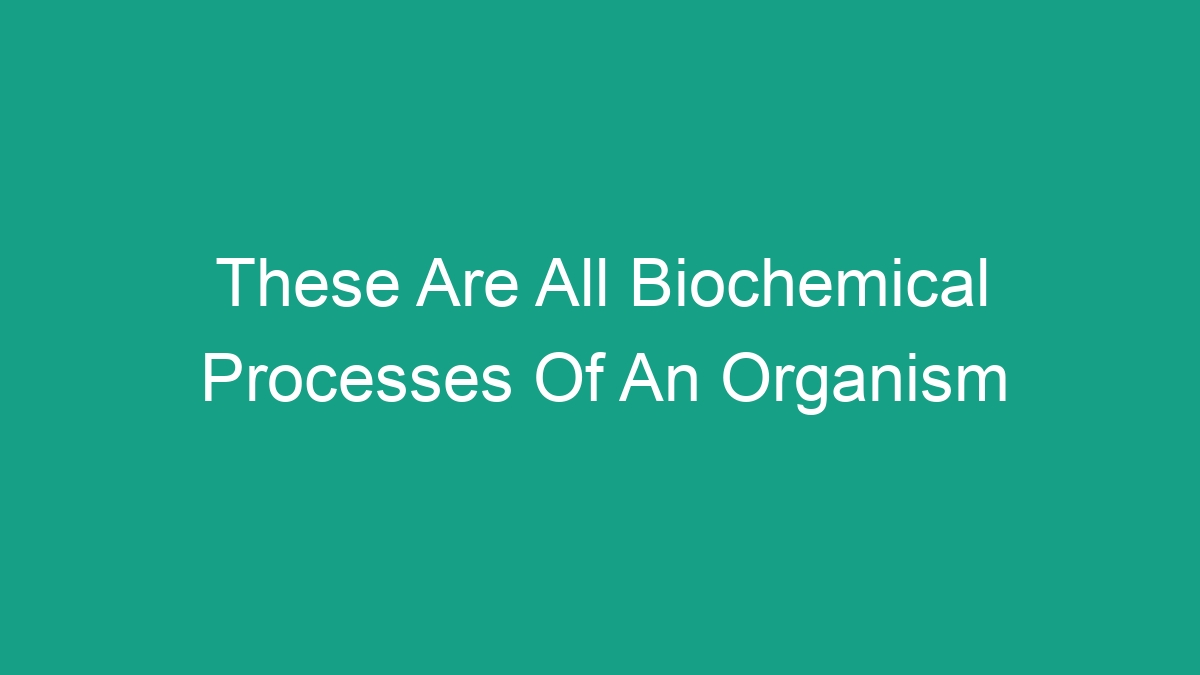
Biochemical processes are the chemical reactions that take place within living organisms. These processes are crucial for the functioning and survival of organisms, as they are responsible for maintaining the balance of various compounds and energy within the body. From metabolism to photosynthesis, these biochemical processes play a vital role in sustaining life. In this article, we will explore the various biochemical processes of an organism and their significance in detail.
1. Metabolism
Metabolism is the sum of all biochemical reactions that occur within an organism. It can be divided into two main types: catabolism and anabolism. Catabolism involves the breakdown of complex molecules into simpler ones, releasing energy in the process. Anabolism, on the other hand, is the synthesis of complex molecules from simpler ones, requiring energy input. Together, these processes regulate the flow of energy and nutrients within the body, enabling the organism to grow, reproduce, and maintain homeostasis.
2. Photosynthesis
Photosynthesis is a biochemical process that occurs in the chloroplasts of plant cells, as well as in some bacteria. It involves the conversion of light energy, carbon dioxide, and water into glucose and oxygen, using the pigment chlorophyll. This process is crucial for the production of food and oxygen in the ecosystem, making it essential for the survival of various organisms, including humans.
3. Cellular Respiration
Cellular respiration is a series of biochemical reactions that take place within the mitochondria of cells. It involves the breakdown of glucose and other organic molecules to release energy in the form of ATP (adenosine triphosphate). This energy is then used to power various cellular processes, such as muscle contraction, nerve impulse transmission, and biosynthesis. Without cellular respiration, organisms would not be able to generate the energy needed to carry out essential functions.
4. DNA Replication and Protein Synthesis
DNA replication is the process by which a cell makes an identical copy of its DNA in preparation for cell division. This ensures that genetic information is passed on to the next generation of cells. Protein synthesis, on the other hand, is the process by which cells make proteins using the information encoded in their DNA. Proteins are essential for the structure, function, and regulation of the body’s cells, tissues, and organs.
5. Hormone Regulation
Hormones are chemical messengers produced by endocrine glands that regulate various physiological processes, such as growth, metabolism, and reproduction. These biochemical processes involve the synthesis, release, and transport of hormones to target cells, where they exert their effects by binding to specific receptors. Hormone regulation is crucial for maintaining internal balance and coordinating the functions of different organs and tissues within the body.
6. Immune Response
The immune response is a complex series of biochemical processes that protect organisms from foreign invaders, such as bacteria, viruses, and other pathogens. This involves the recognition of foreign antigens, activation of immune cells, and the production of antibodies to neutralize or eliminate the threat. Without an effective immune response, organisms would be vulnerable to infection and disease.
7. Digestion and Nutrient Absorption
Digestion is the process by which food is broken down into smaller, soluble molecules that can be absorbed and utilized by the body. This involves the action of enzymes and acids in the digestive system to hydrolyze carbohydrates, proteins, and lipids. Nutrient absorption occurs in the intestines, where the digested molecules are transported into the bloodstream for distribution to cells throughout the body. These processes are essential for providing organisms with the energy and nutrients they need to function and grow.
8. Oxidative Phosphorylation
Oxidative phosphorylation is the final stage of cellular respiration, where the energy released from the breakdown of glucose is used to produce ATP. This process occurs in the inner membrane of the mitochondria and involves a series of redox reactions that transfer electrons through the electron transport chain. Oxidative phosphorylation is a key biochemical process for generating the majority of ATP in aerobic organisms.
Conclusion
These biochemical processes are essential for the survival and functioning of organisms. From metabolism to immune response, they all contribute to the maintenance of homeostasis and the overall well-being of living organisms. Understanding these processes is crucial for advancing scientific knowledge and developing new treatments for various diseases and disorders.
FAQs
What are some examples of biochemical processes?
Some examples of biochemical processes include metabolism, photosynthesis, cellular respiration, DNA replication, protein synthesis, hormone regulation, immune response, digestion, nutrient absorption, and oxidative phosphorylation.
Why are biochemical processes important?
Biochemical processes are important because they are responsible for maintaining the balance of various compounds and energy within the body. They are crucial for the functioning and survival of organisms, enabling growth, reproduction, and the maintenance of homeostasis.
How are biochemical processes studied?
Biochemical processes are studied using various experimental techniques, such as spectroscopy, chromatography, and mass spectrometry. These techniques allow scientists to analyze the chemical composition and reactions within living organisms, providing insights into the underlying mechanisms of different biochemical processes.
As new discoveries and technologies emerge, our understanding of biochemical processes continues to evolve, paving the way for further insights and advancements in the field of biology and medicine.



